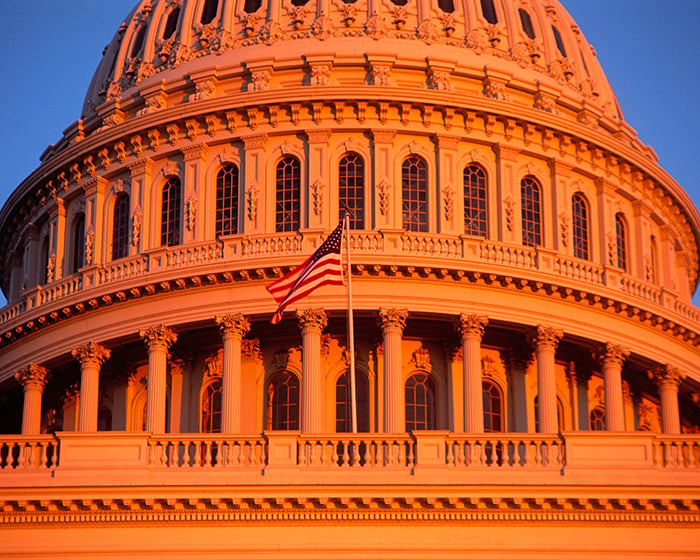Key Takeaways
- The One Big Beautiful Bill significantly alters SALT deduction limits and key business provisions impacting state income tax.
- States must decide whether to conform to or decouple from new federal tax law changes, leading to varied impacts on budgets and compliance requirements.
- Complex federal changes to depreciation, research expensing, interest limitations, and international taxation create new state-level planning and compliance challenges for taxpayers and businesses.
The One Big Beautiful Bill Act (OBBB) significantly impacts state taxation. Here’s what you need to know.
Impact on State Pass-through Entity Tax Elections
A major OBBB change for individual taxpayers involves a substantial modification to the SALT deduction limitation or “cap”. The federal SALT cap will increase from $10,000 to $40,000 for individual taxpayers filing a joint return with adjusted gross income (AGI) of $500,000 or less.
State Conformity to OBBB
Unlike the federal government, the states must balance their budgets annually and states must decide whether to conform to or “decouple” from taxpayer favorable OBBB provisions that flow to the states’ federal taxable income or adjusted gross income “starting point”.
The states conform to federal tax law in different ways. About half adopt federal tax law as of a fixed date set by the legislature. These so-called “fixed” conformity states will not adopt the OBBB until the fixed date is changed to incorporate its July 4, 2025, adoption date. In these states, policymakers have time to consider the impacts before making conformity decisions.
The remaining so-called “rolling conformity” states automatically incorporate federal law changes. In these states, the OBBB was incorporated into state law when the President signed the OBBB into law. These states must move quickly to consider the OBBB’s budget impacts and adopt legislation to decouple from provisions they choose not to conform to.
Key OBBB Business Provisions Affecting State Taxes
Other key provisions that will impact state and local tax include:
Bonus Depreciation and Other Property Expensing Provisions
The OBBB permanently reinstates 100% bonus depreciation for qualified property acquired and placed in service after January 19, 2025. The OBBB also creates a new IRC section 168(n) that allows immediate expensing for qualified production property. Small and mid-sized businesses also benefit from increased expense limitation and phaseout under IRC section 179.
Prior to the OBBB, states took a wide variety of approaches toward conformity with bonus depreciation. The 20 states that either fully or partially conform to bonus depreciation under IRC section 168(k) must decide whether to conform to the OBBB’s restoration of bonus depreciation or join the decoupling states and allow it to phase out after 2026.
States must also decide whether to conform to the new expensing for qualified production property and changes to the IRC section 179 exemptions and phaseouts. In any event, the new OBBB provisions will add new complexities for businesses in tracking state modifications, basis differences, and differences in gains on dispositions.
174 Research and Experimentation
Beginning in 2025, the OBBB restores the immediate expensing of domestic research and experimentation expenditures. After December 31, 2021, such expenditures were required to be capitalized and amortized over a five-year period.
The OBBB also allows a catch-up deduction for previously capitalized and unamortized amounts incurred from 2022 to 2024. Large businesses can fully expense such unamortized costs either on their 2025 tax return or over two years beginning in 2025. Small businesses (for this purpose, average annual gross receipts less than $31 million) can retroactively expense their unamortized costs by filing amended returns.
Some states never adopted the TCJA provision requiring capitalization of domestic research and experimentation expenditures. These states already conform with the OBBB. However, a majority of states did adopt the 2022 changes. These states must decide whether to continue capitalization or conform to the OBBB’s restoration of expensing. For those states that continue capitalization, taxpayers will face challenges tracking and applying state modifications each year to reflect the state-federal differences.
States that adopt the new OBBB provisions will also have to decide whether to adopt the catch-up provisions, including whether small businesses can file state amended returns for tax years 2022 to 2024.
163(j) Interest Limitation
The OBBB favorably expanded the IRC section 163(j) interest limitation by restoring the definition of adjusted taxable income (ATI) to an EBITDA based computation vs. the current EBIT based computation. This change adds to a litany of computational changes over the past several years since the new limitation was created by the TCJA, including a change from 30% to 50% only for 2019 and 2020 under the CARES Act.
States have taken varied approaches to conforming to 163(j). Some have fully decoupled and allow unlimited deduction of interest expense. Others have adopted only the TCJA limitation, not the CARES Act changes. Still others have fully conformed to both the TCJA and CARES Act modifications.
International Provisions
The OBBB broadens the amount of foreign source income included in US multinationals’ federal income though the conversion of GILTI to the more expansive NCTI concept, the reduction of the GILTI deduction, and lesser allocation of expenses against the new NCTI inclusion.
While foreign source income is broadened, the OBBB lessens the federal tax impact through more expansive foreign tax credit provisions. Many states include foreign source income in their tax base through conformity to federal taxable income. However, states do not generally employ a foreign tax credit concept. As a result, the OBBB will generally result in higher state taxable income with no corresponding credit for foreign taxes.
Roughly half of the states tax some portion of GILTI. Most of these states fully include GILTI in the tax base but allow for a dividend received or foreign source income deduction ranging from 5% to 50% of the GILTI inclusion. To maximize the revenue impact of the broadened foreign source income base, we might expect non-conforming states to conform and include NCTI in their tax base and/or conforming states to reduce or eliminate their foreign source income or dividend received deductions. More states could also consider decoupling from the newly expanded FDDEI (formerly FDII) deduction.
The OBBB’s international provisions are likely to cause significant state conformity challenges. Multinationals in non-conforming states must continue computing inclusions/deductions under the historic GILTI and FDII concepts and make corresponding modifications. This could be an immediate concern in fixed conformity states that have not yet changed their conformity date to adopt the OBBB.
Strategic Implications and Planning Considerations
The evolving state tax landscape created by the OBBB requires careful attention for taxpayers and practitioners. The state tax implications of the OBBB will evolve quickly as states respond to the federal changes. We can help you stay informed and understand federal changes and the evolving state responses.
Stay Up to Date

State and Local Tax
A trusted team can take the headache out of your sales and income tax compliance needs.
Who We Are
Eide Bailly is a CPA firm bringing practical expertise in tax, audit, and advisory to help you perform, protect, and prosper with confidence.




